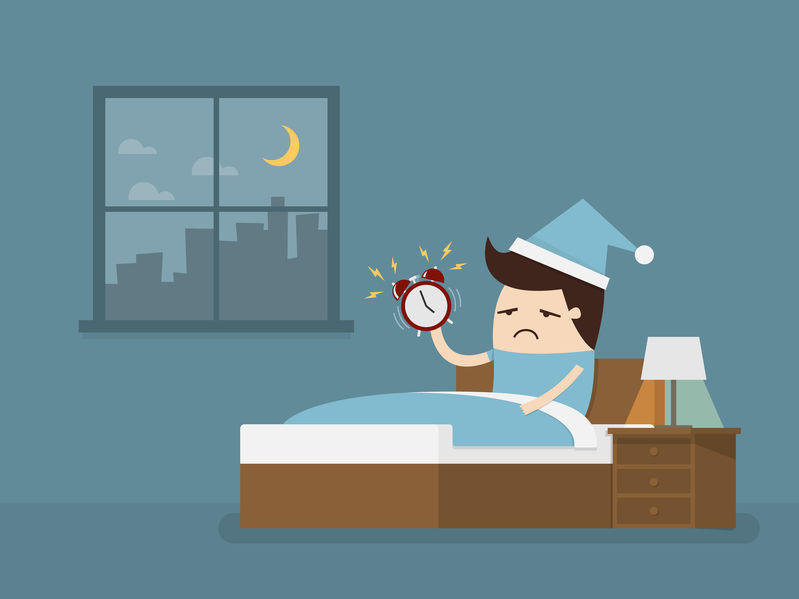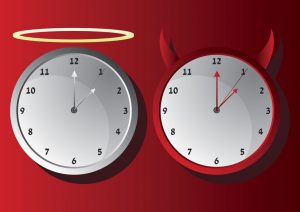Your Snooze Alarm: Bane or Blessing?

When your alarm clock goes off in the morning, do you
a. immediately turn it off and bounce right out of bed?
b. hit “snooze” and get a few more minutes of sleep?
c. hit “snooze” repeatedly until the last possible moment?
d. throw your alarm clock or cell phone across the room and sleep another hour and a half?
According to surveys conducted in the past several years, over half of us in the U.S. regularly hit the snooze button at least once. One survey done in 2014 even notes that we spend an average of 3.5 months of our lives hitting the snooze button. Ouch!
Snoozing Through History
So, how did the snooze alarm come into being?
First came the plain old alarm clock. The history of the alarm clock is pretty interesting in and of itself. The earliest alarm clock was arguably the sun. Later on, possibly servants for the well-to-do and roosters for everyone else. As for mechanical alarm clocks, right around 2,400 years ago, Plato is thought to have used a water clock system to wake himself, and his loyal students, up in time for lectures at dawn.
Fast-forward to the mid-to-late 1800s, when the first adjustable mechanical alarm clocks were patented. These clocks were a boon for punctuality and in high demand. When World War II caused the manufacturing operations of most consumer products to be suspended and converted to support the war effort, the lack of a supply of new and reliable alarm clocks caused many factory workers to be late, or even not show up for their shifts. As a result, alarm clocks were one of the first non-war related products to be allowed to begin production again.
It wasn’t until the mid-1950s that General Electric introduced their “Snooz-Alarm”, which allowed an extra five minutes, and Westclox launched their “Drowse Electric”. This clock had a rocker button that allowed users to select a five or ten-minute reprieve.
9-Minute Mystery
For the last half-century or so, alarm clocks, and even most smartphone apps, have settled on 9 minutes as the definitive snooze alarm increment. How come?
Back in the early days of the snooze alarm concept, all clocks functioned using gear systems. That presented some limitations on the simplest increments that were possible. Two options were deemed to be the most workable, and they were just over 9 minutes, and just over 10 minutes. The developers of these first snooze alarm clocks decided that a single-digit delay was simpler to engineer than a double-digit. They also agreed that 10 minutes might allow users to fall back into deep sleep and thought that 9 minutes was a safer bet for users to wake up more easily.
Since then, it’s pretty much been a matter of “if it ain’t broke, don’t fix it”. At least 3 generations have become accustomed to 9-minute snoozes. It’s just the way it’s done.
Of course, with more and more of us using our phones as our alarms, we can customize our snooze increments to our hearts’ content.
Is your snooze alarm a bane or a blessing?
We’ve established that plenty of us are making use of the snooze alarms on our clocks and phones. Now it’s time to look at whether they are good or evil? Right or wrong? Help or hindrance? Healthy or harmful? Okay, I’m done.
Sleep experts are almost unanimous in recommending we not use snooze alarms.
Sleep expert, Dr. Michael Breus, PhD, goes so far as to say it is “the worst invention ever.”
He cites memory problems and daytime drowsiness as potential side-effects of using the snooze. He also notes that having the alarm go off time after time is a jolt that causes your body to go into fight-or-flight mode, with the ensuing adrenaline and cortisol surges that come with that state. On top of all that, the time between alarms isn’t enough for the sleep you might get to be at all restorative.
That point is echoed by other sleep doctors and experts. They feel that if you are going to keep snoozing for a half hour or more, you’d be better off to set the first alarm to that later, “must-get-up” time and allow that time to be truly restful. So then, if it’s not making us feel more rested and helping us get moving in the morning, not to mention get through the day, why do so many of us persist in hitting the snooze button?
People whose partners hit the snooze button more times are significantly less satisfied with their relationships.
Personally, I like the feeling of waking up and knowing I’ve got a little time left to sleep. You know what I’m talking about. Even when you happen to wake up in the night and look at the clock and you see that it’s only 3:47 am. When you realize you have another 2 or 3 hours to sleep, it’s a relief and it feels delicious. Flop yourself over and snuggle back in. You don’t have to face the day quite yet!
I’m not crazy about having to pop right out of bed the moment my first alarm goes off. I’ve done it plenty of times, and it’s possible. I hate that moment with a passion. It doesn’t really start my day off badly or anything. It’s just…I hate that moment! I like a buffer between alarm and dragging myself out of bed.
Ever since I began using my phone for my alarm instead of the big, 20-year-old clock-radio across the room, I haven’t really hit the actual snooze button. But I do set multiple alarms for myself, and that works really well for me. For example, the first alarm goes off about 15 to 20 minutes before I want to get up. That’s my buffer. Then another alarm goes off at the time I intend to actually get up. I have a third alarm, and that time is the absolutely, positively latest time I can get out of bed and still be on time. It’s my emergency backup.
Dr. Breus actually confirms that a 20-minute snooze may be better than the traditional 9 minutes. I was glad to find out that I was on the right track, all on my own!
Whether or not using a snooze alarm is a good idea, I’m sure it’s here to stay. After all, there’s an actual song about it. Enjoy!
